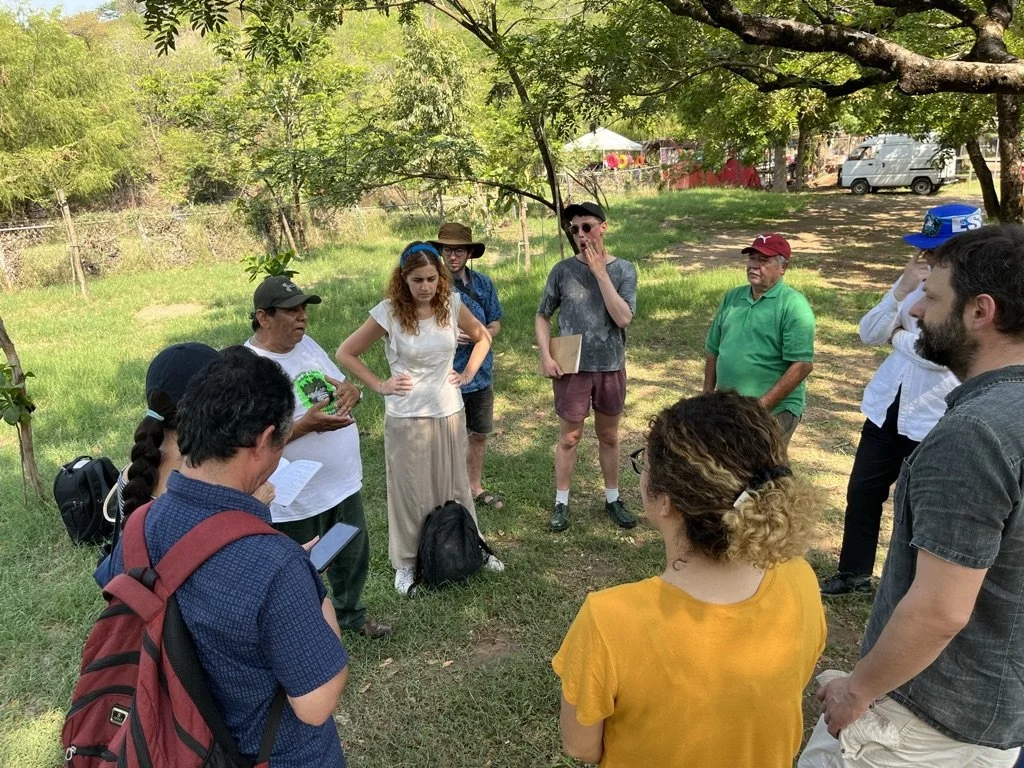Dr. Giada Ferrucci, Western Postdoctoral Fellow, Western University
I am a currently a Western Postdoctoral Fellow at Western University (Canada), jointly appointed at the Faculty of Information and Media Studies at Western Libraries. I hold a Ph.D. in Media Studies from Western University, a Master's degree in International Studies from Aarhus University (Denmark), and a Bachelor's degree in Economic Development and International Cooperation from the University of Florence (Italy). My research and professional experience focus on addressing social and environmental justice, particularly in Central America. I critically analyze the communication and advocacy strategies employed by land and environmental defenders, emphasizing their organized networks of resistance against extractivism in their communities.
During 2017-2018, I worked as an intern for CRIPDES – The Association for the Development of El Salvador, where I first joined the Surviving Memory in Postwar El Salvador project. I contributed to multiple initiatives, including translating and transcribing testimonies related to the role of music during the Civil War, supporting mental health research and training programs, and facilitating digital preservation and community archive training workshops. As a Research Assistant for the Surviving Memory project over the past seven years, my work has resulted in several publications, including a forthcoming piece on revolutionary songs by Norberto “Don Tito” Amaya (Journal of the American Musicological Society) and another on the project's Media Library at Centro Arte para la Paz (Nuevos Mundos).
In my doctoral dissertation, Networks of Resistance: A Regional Analysis of Extractive Conflicts in Central America, I explore the strategies of anti-mining activists and the role of community-based communication in promoting the right to consultation and challenging corporate narratives. Grounded in environmental justice, this work underscores the importance of coalition-building, framing, and storytelling in mobilizing communities against extractive industries. My related publications critically examine the socio-political contexts of the coffee industry in El Salvador (2023) and the mega-tourist industry in Honduras (2023) and how they exacerbate migration and displacement.
I have also collaborated on several reports and book chapters documenting social, environmental, and legal concerns related to mining in Central America, including the Cerro Blanco open-pit mine in Guatemala (2024) and the mining conflict in Honduras' Lower Aguán Valley (2020, 2022). Through these diverse publications, I contribute to a growing body of literature that emphasizes the critical role of community-based activism in challenging extractive industries and advocating for environmental justice.
My research experience spans roles such as Lead Research Assistant for the Surviving Memory in Postwar El Salvador project, where I facilitated workshops and conducted interviews, and Research Assistant for projects like “HEARCON: Hearing Conflicts" and "Community Perspectives on Climate Change.” I have also contributed to the research fellowship “The Diplomacy of Diaspora and Migration Museums” under the supervision of Dr. Sarah Smith, Canada Research Chair in Art, Culture and Global Relations (Tier 2), where my responsibilities include conducting literature reviews, designing ArcGIS mapping, and conducting semi-structured interviews. In this research, I co-authored the report Between Here and There: Surveying the Global Work of Diaspora, Migration, and Mobility-Engaged Museums (2023).
In addition to my academic contributions, I am deeply committed to public-facing scholarship. I have written for public press outlets like NACLA, The Conversation, and the National Post, highlighting critical issues related to environmental justice and mining. I have also contributed to discussions on education and environmental issues, especially for newcomers, for New Canadian Media and Alternatives Journal: Voices of Canada’s Environment.
Currently, as a Western Postdoctoral Fellow, I am engaged in a research program at Western University that I call “Environmental Memory, International Solidarity, and Community Archives in Postwar El Salvador.” This work is oriented at the intersection of memory studies, environmental justice, and community-based archival practices. Under the supervision of Dr. Amanda Grzyb, Tom Belton (Western Libraries), and Zack MacDonald (Western Libraries), I aim to amplify stories of environmental memory and international solidarity through collaborations with organizations like Asociación Sumpul and the Salvadoran Canadian Association (ASALCA). My academic pursuits are deeply intertwined with community activism, focusing on creating a more just and inclusive future through collaboration with “memory stewards.” In my research projects, I aim to deepen understanding of environmental justice, diaspora experiences, and international solidarity. My work is organized into three main projects:
Landscapes of Memories: This project, in collaboration with rural communities in El Salvador, focuses on archiving stories about plants, land, and water to document the intersections of environmental justice and historical memory. By conducting nature walks and collecting narratives from six community members across Morazán, Cuscatlán, and Chalatenango, we will create an Atlas of Environmental Memories that highlights the enduring connections between people, place, and memory.
Diasporic Epistemologies: In collaboration with ASALCA, I am co-creating a community book that documents the experiences of the Salvadoran diaspora. This book will curate testimonials and images that celebrate the cultural, political, and imaginative dimensions of Salvadorans abroad, fostering a sense of identity and belonging while reflecting on their collective memory and ties to their homeland.
Pedagogy of Solidarity: In partnership with the Center for Research on Latin America and the Caribbean (CERLAC), this project will focus on digitizing records documenting solidarity efforts between Canada, the U.S., and El Salvador. The project will culminate in a planned exhibition and a co-authored book that integrates archival materials from CERLAC, Oxfam Canada, and Centro Arte para la Paz, enhancing access to historical materials and enriching the understanding of international solidarity practices from the 1980s onward.





